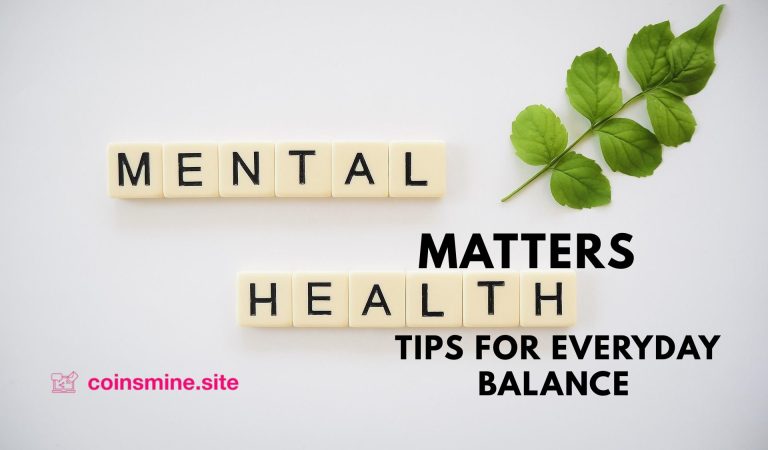Mental Health Matters: Tips for Everyday Balance: It can be difficult to keep mental equilibrium in the fast-paced world of today. Managing relationships, a job, and everyday stress frequently leaves little time for emotional health. However, taking care of your mental health is equally vital as taking care of your physical health. Small, thoughtful behaviors can have a long-lasting effect; major adjustments aren’t always necessary.
Creating balance involves making decisions that promote a healthier mind, from better sleep to establishing limits. One step at a time, we’ll look at doable, everyday strategies in this post to help you maintain your composure, lower stress levels, and take care of your mental health.
Mental Health Matters: Tips for Everyday Balance
Mental Health Matters: Tips for Everyday Balance: It’s more crucial than ever to maintain mental equilibrium in a world that moves quickly and has many demands. Although we frequently prioritize physical health, mental health is just as important for living a happy life. The good news? Maintaining excellent mental health doesn’t require extravagant gestures or significant life changes. Long-lasting change can be achieved with daily small, persistent activities. Here are some doable strategies to help you maintain mental and emotional equilibrium daily.
(1) Start with a morning routine.
The remainder of your day is determined by how you begin it. You might feel more prepared and grounded by following a basic morning routine. This doesn’t mean waking up at 5 a.m. for an hour-long workout—unless you want to. Deep breathing, gentle stretching, or even just ten minutes of silent contemplation can have a significant impact. Focus on setting up a calm, intentional environment for the day rather than checking your phone as soon as you wake up.
(2) Prioritize Sleep.
Despite being crucial for mental well-being, sleep is frequently foregone for the sake of productivity. Emotional resilience, focus, and mood are all impacted by little sleep. Every night, aim for 7 to 9 hours of restful sleep. Establish a calming nighttime ritual, cut back on screen time an hour before bed, and maintain a quiet, dark, and cold sleeping environment. Your brain needs to relax in order to perform at its peak, so consider sleep as mental maintenance.
(3) Stay Physically Active.
Mental and physical health are closely related. Frequent exercise helps lower stress and anxiety levels and releases endorphins, which are natural mood enhancers. Even a 20-minute stroll, a dance class, or some gentle stretching at home can improve your mood; you don’t have to go to the gym every day. Consistency is crucial. To make it something you look forward to rather than a chore, pick an activity you enjoy.
(4) Practice Mindfulness.
In times of stress, it can assist in promoting clarity, focus, and a reduction in anxiety. In addition to meditation, mindfulness can be achieved by slowing down and paying close attention to your environment, whether you’re strolling through the outdoors or sipping your morning coffee. Try dedicating a short period each day to just breathing and paying attention to your thoughts without responding to them.
(5) Connect with Others.
Since humans are social creatures, connection is essential to mental health. Set aside time for those who encourage and support you. It’s not always necessary to have lengthy discussions; sometimes a quick chuckle or conversation with a buddy can have a profound impact. If you’re feeling lonely, don’t be afraid to get in touch.
(6) Set Boundaries.
Burnout can happen rapidly if you say yes to everything. Being able to say no is a sign of respect for oneself. Understand your limits and communicate them clearly—whether at work, with family, or in your social life.
(7) Limit Digital Overload.
Although technology helps us connect, it can also be too much to handle. Social media, news, and constant notifications can all exacerbate anxiety and low self-esteem. Attempt to unplug frequently. To help you stay focused, set up specific periods or areas of your day to be screen-free. A book, pastime, or a stroll outside can take the place of doomscrolling.
(8) Seek Help When Needed.
Needing help is not a sign of weakness. Getting perspective, controlling emotions, and overcoming bad habits can all be greatly aided by speaking with a therapist or counselor. Mental health providers are there to support our mental and emotional well-being, much like we see doctors for physical health issues.
Final Thoughts.
Perfection is not synonymous with balance. There will be ups and downs in life, but the daily practice of small habits can help you become more resilient, manage stress, and live a better life overall. Your mental health is the cornerstone of all else you do, so give it top priority.



